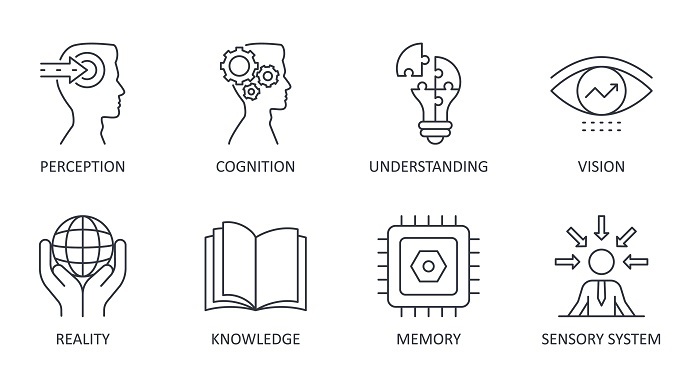
 Data Structure
Data Structure Networking
Networking RDBMS
RDBMS Operating System
Operating System Java
Java MS Excel
MS Excel iOS
iOS HTML
HTML CSS
CSS Android
Android Python
Python C Programming
C Programming C++
C++ C#
C# MongoDB
MongoDB MySQL
MySQL Javascript
Javascript PHP
PHP
- Selected Reading
- UPSC IAS Exams Notes
- Developer's Best Practices
- Questions and Answers
- Effective Resume Writing
- HR Interview Questions
- Computer Glossary
- Who is Who
Factors that Affect the Perception of an Individual
Before discussing anything about the above topic, let's first understand what is meant by "perception."
Perception is a process by which an individual interprets anything that comes in front of him or her. It is the way in which he or she utilizes his or her sensory impressions to interpret a particular situation and give a particular meaning to the environment. However, what we perceive can differ widely from what reality is.
For example, most employees view an organization as the best place to work because it has favorable working conditions, interesting job roles, better pay, and excellent benefits, but not all employees agree. There will be more categories of employees who perceive the organization to be just the opposite of what is discussed above.
The perception of an individual is an important part of organizational behavior because people's behavior is based on their perception of reality, not on reality itself.

Now let's discuss the factors that affect the perception quickly
How can we explain the fact that an individual may look at the same thing yet perceive it differently? There are several factors that shape and sometimes distort perception. The factors can reside in the perceiver, in the object or target being perceived, or in the situation that is prevailing at the time the perception is being made.
Factors in the perceiver
When we look at a target and try to interpret what we see, our interpretation is widely dependent on our characteristics. Let's look at each of them ?
Attitudes ? Our attitudes towards anything or anyone have a great impact on our perception. And our attitudes are developed around our living background. Our childhood, our upbringing, and the nature of the people around us form and nurture our attitudes. So our attitude towards a particular target is one of the major factors that influence perception.
Motives ? The motive behind anything helps to shape and sometimes distort our perception. Suppose we go for an interview and the motive behind the interview is to get an urgent job, we will perceive everything to be decent and good, and if we already have many options and our motive is to choose anyone among them, then we will start encountering good aspects as well as bad aspects.
Interest ? We perceive the target as favorable and good if we have an interest in it. For example, if we choose a particular college because it offers scholarships, we will perceive it to be better than other colleges.
Experience ? Our experience and expertise also shape our perceptions. A particular child can view a cartoon as the best thing to enjoy, but a youngster may or may not have any interest in it; he or she may like rock music instead of that, and an old person may not have any interest in any of them. So years of experience shape and modulate our perception towards anything.
Expectations ? Our expectations of anyone or anything affect our perception. For example, the expectation of our parents with our exam result makes them perceives differently with a particular situation. The same goes for our expectations of our parents to understand our goals in life and make them perceive us differently in a particular situation.
There are a set of factors in the target that affect our perception. Let's look at each of them
Novelty ? The quality of being innovative and different is a pivotal point in any target that affects its perception by someone. Suppose in a set of children a child is very outspoken; the teacher will perceive him to be the best among the group.
Motion ? The motion of a particular target helps an individual perceives it differently.
Sounds ? The sound of a particular place, thing, or person affects the perception of them by different people a lot. A loud person is perceived as a more confident fellow than a slow-spoken person, who is perceived to be underconfident.
Size ? The size of a particular target also has a lot to do with how different people perceive it.
Background ? Suppose we see an ornament in a lavish gold shop. We will perceive it to be luxurious and lucrative, but if we see the same ornament on the road, our perception will change. So background matters a lot when making perceptions about anything or anyone.
Proximity ? The closeness or similarity of a particular target with the perceived object has a lot of influence on the perception. For example, if we are Indian, we will surely emphasize Indian music more than a foreigner.
Similarity ? The similarity of a particular person or thing with the target affects the perception on a wide scale.
Sometimes the situation of a particular target affects its perception
Time ? the time it takes for a particular situation to happen affects its perception. If it's a sunny day, then we perceive a child's drink to be the most lovable thing to have, but if it's a chilly winter day, we perceive coffee to be the most lovable thing to have.
Work setting ? The setting of work at different organizations affects their perception by their employees. Suppose there is an office with hectic work schedules and tedious, tiring work days. Employees of this organization may be reluctant to work there, but if there is a similar organization with fun activities and lots of incentives, employees of this organization may love where they work.
Social setting ? The people around us affect the perception of us by different people. For example, many people perceive Bihari to be low, but at the same time, a Bihari can be the most wonderful person on earth.
Conclusion
There are different factors that affect an individual's perception. The favor can be in the target to be perceived, the perceiver, or the situation itself.

